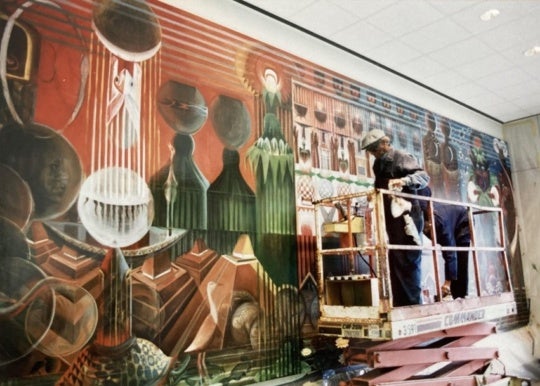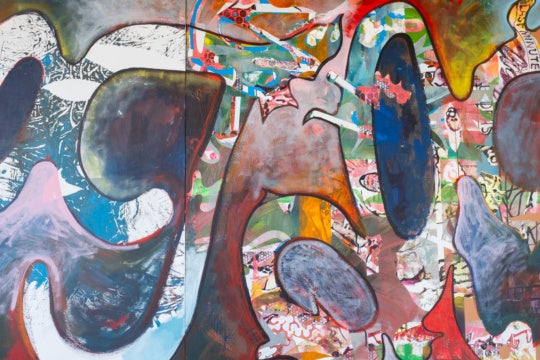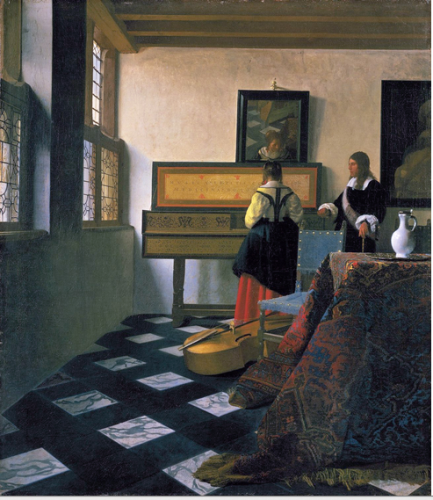
1662-65. Royal Collection, St. James Palace, London.
Was Vermeer a machine? This is a question posed by art critic Phillip Steadman in the new feature length documentary Tim’s Vermeer, which opens Friday, March 7, at Atlanta’s Regal/UA Tara cinema. The film follows the research and experiments of wealthy and eccentric inventor, graphic designer, and businessman Tim Jenison, who became obsessed with the idea that the work of Dutch painter Johannes Vermeer was created with the use of optical lenses, camera obscura, and mirrors. He argues that Vermeer’s process was, in effect, a type of objective mechanical reproduction, prompting the metaphorical question from Steadman.
Most curiously in the film, Jenison, neither a painter nor an art historian, seeks to demonstrate his theories by attempting to paint his own Vermeer. We follow him over his years of research, his reconstruction of Vermeer’s studio in a San Antonio warehouse, his building of a camera obscura, and finally his attempts to paint a replica of Vermeer’s masterpiece The Music Lesson with all the techniques that Vermeer might have used, even down to grinding his own pigments and creating his own lens for the camera obscura. Without any training in oil painting or art, he slowly but surely paints a Vermeer-like work, creating a convincing case that the technologies he demonstrates might indeed have been used by the artist.
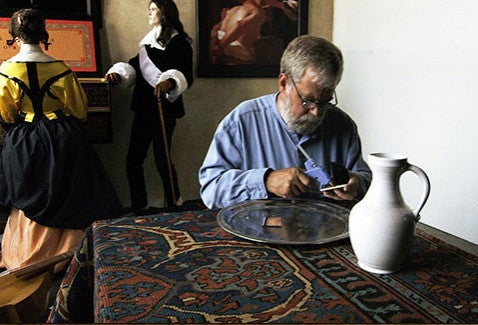
The film was made by magicians Penn and Teller, also known for their Showtime documentary series, Penn & Teller: Bullshit!, in which the duo examine and debunk various superstitions, political beliefs, fads, and misconceptions through skeptical inquiry. The film isn’t as broad, blunt, or confrontational as the TV series, but it does have a sort of jazzy and appealing pop sensibility and fleetness. Things clip along at the speed of a good murder mystery and even non-art history buffs will be intrigued by the various clues, false leads, and breakthroughs in Jenison’s quest. One of the film’s great pleasures is watching Jenison recreate The Music Lesson, a process that takes 130 working days in terms of actual painting (about five years including research and building the replica of Vermeer’s studio).
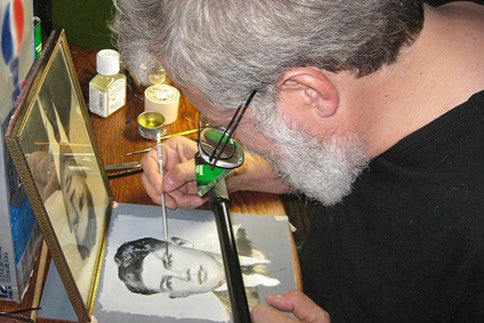
in Tim’s Vermeer. Sony Pictures Classics.
In the end, Jenison takes his case to the experts, painter David Hockney, author of Secret Knowledge: Rediscovering the Lost Techniques of the Old Masters, and Steadman, author of Vermeer’s Camera: Uncovering the Truth Behind the Masterpieces, who have both proposed theories similar to Jenison’s but didn’t develop or demonstrate a particular technique. Both appear in the film and are seemingly convinced by Jenison’s case. “I think it might disturb quite a lot of people,” says Hockney, getting at the beating heart of the film. The unveiling of the possible technique, successfully deployed, raises some intriguing and ultimately unanswerable questions about objective reproduction versus aesthetic creation. Jenison argues that Vermeer may have been more of a tinkerer or experimenter, or as he puts it, “a geek,” than the unfathomable, romantic artistic genius we often imagine. What constitutes proof, particularly into an area of investigation as nebulous as artistic process?
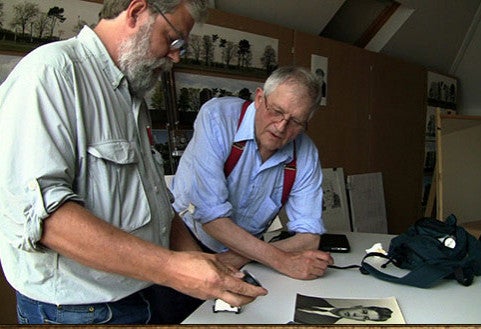
Surprisingly little is known about Vermeer’s life and training: most of the documentation we have about Vermeer’s technique is simply in the paintings themselves. We may never know definitively. Strangely, despite Penn and Teller’s background, we never hear an informed skeptic’s take on Jenison’s experiment. The experiment is successful in that it’s replicable: we see too few people give the technique a shot, though Steadman does at one point.
The film brings to mind the recent “Girl With a Pearl Earring” exhibition at Atlanta’s High Museum of Art, as well as the museum’s current survey of photographs by Abelardo Morrell, who constructs camerae obscurae and photographs the results.
In the end, Tim’s Vermeer is a focused and taut depiction of geeky obsession and creative inspiration, laced with the intriguing suggestion that the two modes might be much closer to each other than we typically imagine.
Andrew Alexander is an Atlanta-based critic who covers visual art, dance, and theater.
Upcoming venues and dates in the South:
March 12
Naro in Norfolk, VA
March 14
SFS Burns Court Cinema in Sarasota, FL
Theatres at Canal Place, New Orleans, LA
Manor Twin, Charlotte, NC
March 16
Green Hills Commons 16, Nashville, TN
March 21
Edge 12, Birmingham, AL
Hollywood 18, Huntsville, AL
Gainesville 14, Gainesville, FL
Beach Blvd Cinema 12, Jacksonville, FL
Governor’s Square 12, Tallahassee, FL
Woodland Square 20 Theatres, Oldsmar, FL
Governor’s Square 12, Tallahassee, FL
Cherrydale Stadium 16, Greenville, SC
Regal Downtown West 8, Knoxville, TN


